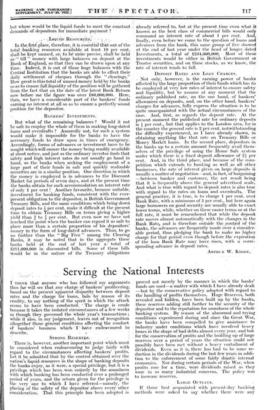DEPOSIT RATES AND LOAN CHARGES.
• Not only, however, is the earning power of banks affected by the large proportion of their funds which has to be employed at very low rates of interest to ensure safety and liquidity ; but to assume at any moment that the ordinary published rate, on the one hand, of bankers' allowances on deposits, and, on the other hand, bankers' charges for advances, fully express the situation is to be quite unacquainted with the actual circumstances of the case. And, first, as regards the deposit rate. At the present moment the published rate for Ordinary deposits is per cent., but that applies to the London area, for in the country. the general rate is 2 per cent. notwithstanding the difficulty experienced, as I have already shown, in obtaining anything like that rate on Treasury Bills or Money Market. loans. In the secorid place, depositors in the banks up to a certain amount frequently avail them,- selves of the privilege of using the Home Safe system under which there is a -fixed deposit allowance of 2i per cent. And, in the third place, and because of the com;- petition which extends, to banking as well_as all other businesses, the rate of interest given on, large deposits usually a matter of negotiation—and, in fact, of bargaining —between banker and customer, the net result being that it is frequently above the general advertised scalef And what is true with regard to deposit rates is also true with regard to the -rates cm loans and -overdrafts. The general practice, it is true, is to charge 1 per cent. over Bank Rate, with a minimum of 5 -per cent., but here again large borrowers on good security are usually able to exact lower terms, while, whether on these easier terms or at the full rate, it must be remembered that while the deposit rate moves almost automatiCally with the changes in the Bank Rate, and is therefore outside the control 'of the banks, the advances are frequently made over a donsides able period, thus pledging the bank to make no higher charge fcir that period even though before the expiration of the loan Bank Rate may have risen, with a corre- sponding advance in ,deposit- rates.
ARTHUR W. KIDDY.














































 Previous page
Previous page